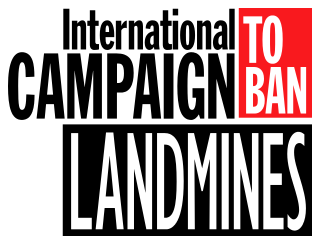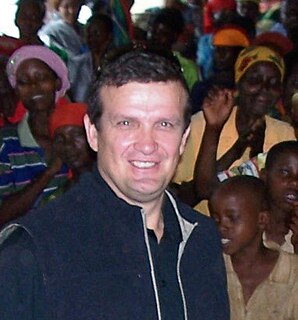The Swiss Campaign to Ban Landmines (the Swiss Campaign or SCBL) is a member of the International Campaign to Ban Landmines (ICBL). It is an umbrella organisation composed of about 50 Swiss NGOs gathered around the common objective of banning antipersonnel landmines and similar indiscriminate weapons (such as cluster munitions or anti-vehicle landmines). At the national level, the Swiss Campaign to Ban Landmines successfully advocated in favor of a national ban of antipersonnel landmines and of Switzerland’s signature and ratification of the Ottawa Treaty in 1995-1997. Within the ICBL, the Swiss Campaign was a member of the Non State Actors Working Group, which it co-chaired until the end of 2004.
The Swiss Campaign has also participated in the creation of Geneva Call, which primarily aims at engaging armed non-state actors in a total ban of antipersonnel landmines. Moreover, the Swiss Campaign has supported the creation of other national campaigns of the ICBL, such as the Nepal Campaign to Ban Landmines and more recently, the Turkish Campaign to Ban Landmines. Both these organisations are now independent members of the ICBL. The Swiss Campaign is also a member of the Cluster Munition Coalition and supports current efforts to ban cluster munitions.
Because mine action programmes and activities do not equally benefit women and men, the SCBL launched a Gender and Mine Action Programme (GMAP) in December 2006. This programme encourages and supports the mine action sector to mainstream gender through its policy, programming and operations. GMAP has been an independent association since June 2011. [1] The general objective of GMAP is to contribute to the reduction of suffering faced by women, men, girls and boys as landmine victims, survivors, families and members of affected communities. This complements current efforts within the United Nations system to mainstream gender throughout mine action projects. GMAP intends to improve mine action effectiveness by increasing awareness on gender and mine action amongst mine action organisations, women's grassroots organisations and other stakeholders. The GMAP is co-located with the Geneva International Centre for Humanitarian Demining in their offices in Geneva, Switzerland.

A land mine is an explosive device concealed under or on the ground and designed to destroy or disable enemy targets, ranging from combatants to vehicles and tanks, as they pass over or near it. Such a device is typically detonated automatically by way of pressure when a target steps on it or drives over it, although other detonation mechanisms are also sometimes used. A land mine may cause damage by direct blast effect, by fragments that are thrown by the blast, or by both.
The Vietnam Veterans of America Foundation (VVAF), established in 1980, now the Veterans for America (VFA), is a Washington, D.C.-based international humanitarian organization that addresses the consequences of war and conflict. The founder of VVAF is Bobby Muller, a former U.S. Marine lieutenant and Vietnam veteran.

Jody Williams is an American political activist known for her work in banning anti-personnel landmines, her defense of human rights, and her efforts to promote new understandings of security in today's world. She was awarded the Nobel Peace Prize in 1997 for her work toward the banning and clearing of anti-personnel mines.

The International Campaign to Ban Landmines (ICBL) is a coalition of non-governmental organizations whose stated objective is a world free of anti-personnel mines and cluster munitions, where mine and cluster munitions survivors see their rights respected and can lead fulfilling lives.

The Convention on the Prohibition of the Use, Stockpiling, Production and Transfer of Anti-Personnel Mines and on their Destruction, known informally as the Ottawa Treaty, the Anti-Personnel Mine Ban Convention, or often simply the Mine Ban Treaty, aims at eliminating anti-personnel landmines (AP-mines) around the world. To date, there are 164 state parties to the treaty. One state has signed but not ratified the treaty, while 32 UN states, including China, Russia, and the United States have not; making a total of 33 United Nations states not party.

The Manitoba Campaign to Ban Landmines (MBCBL) was Canada's only provincial campaign to ban landmines. It was a registered non-profit organization in the province of Manitoba. The MBCBL was a member of the 1997 Nobel Peace Prize co-laureate International Campaign to Ban Landmines (ICBL), Mines Action Canada, and the Cluster Munition Coalition.
Non-state actors include organizations and individuals that are not affiliated with, directed by, or funded through the government.

Survivor Corps, formerly known as the Landmine Survivors Network, is a global network of survivors helping survivors to recover from war, rebuild their communities, and break cycles of violence. The organization currently operates programs in Albania, Armenia, Azerbaijan, Bosnia-Herzegovina, Burundi, Colombia, Croatia, El Salvador, Ethiopia, Georgia, Jordan, Kosovo, Macedonia, Montenegro, Serbia, Uganda, Rwanda, the United States and Vietnam.
The Cluster Munition Coalition (CMC) is an international civil society movement campaigning against the use, production, stockpiling and transfer of cluster munitions. Cluster munitions are a type of explosive weapon widely stockpiled by more than 80 states. They are documented to have caused significant civilian deaths and injuries and have frequently caused indiscriminate effects both during and after conflicts. Their use is prohibited under the 2008 Convention on Cluster Munitions. This convention was formally endorsed on 30 May 2008 in Dublin, Ireland, and was signed by 94 countries in Oslo on 3–4 December 2008. The Convention entered into force and became binding international law on 1 August 2010, after 30 countries formally ratified it. As of 4 January 2012, it had been signed by 111 countries, 77 of which have ratified it.
A mine clearance organization, or demining organization, is an organization involved in removal of landmines and unexploded ordnance (UXO) for military, humanitarian, or commercial reasons. Demining includes mine clearance, as well as surveying, mapping and marking of hazardous areas.
The Geneva International Centre for Humanitarian Demining (GICHD) is an international organisation working in mine action. Based in the Maison de la paix in Geneva, it is legally a non-profit foundation in Switzerland.

Humanity & Inclusion is an international non-governmental organization. It was founded in 1982 to provide help in refugee camps in Cambodia and Thailand. Headquartered in France and Belgium, since its creation, it has opened branches in six other countries : Switzerland, Luxembourg, United Kingdom, Germany, Canada and the United States.

Geneva Call is a non-governmental organization based in Geneva, Switzerland. It is currently focusing its efforts on banning the use of anti-personnel mines, protecting children from the effects of armed conflict, prohibiting sexual violence in armed conflict, working towards the elimination of gender discrimination and building armed non-State actors’ knowledge and implementation of broad International Humanitarian Law (IHL) rules.

Kenneth R. Rutherford is co-founder of the Landmine Survivors Network and a researcher in the field of political science.
Mine action is a combination of humanitarian aid and development studies that aim to reduce the social, economic and environmental impact of landmines and the explosive remnants of war (ERW).
The Uganda Landmine Survivors Association (ULSA) is a non-governmental organization, focused primarily on advocacy and victim assistance throughout Uganda. The organization was founded in April 2005 in order to campaign against the use, production and transfer of landmines, cluster munitions and explosive remnants of war (ERWs). ULSA also serves as a peer to peer support network for survivors, providing them with training in vocational, leadership and advocacy skills in partnership with other organizations throughout Northern and Western Uganda.

The United Nations Mine Action Service (UNMAS) is a service located within the United Nations Department of Peacekeeping Operations that specializes in coordinating and implementing activities to limit the threat posed by mines, explosive remnants of war and improvised explosive devices.
Raphael F. J. McGrath, usually known as Rae McGrath, lives in Langrigg, Cumbria and is a British campaigner and specialist in humanitarian response to conflict and natural disaster. He founded the Mines Advisory Group (MAG), and, as a leading member of the International Campaign to Ban Landmines (ICBL), represented the organisation when it received the Nobel Prize for Peace in 1997. http://www.boes.org/coop/lmines/raemc1.html
Gender mainstreaming in mine action is the application of gender mainstreaming to mine action. It is increasingly being adopted by international and state mine action organizations.

ITF Enhancing Human Security is a humanitarian, non-profit organization founded by the Republic of Slovenia., which specializes in land mine clearance and post-conflict reconstruction. It was established on 12 March 1998 with the purpose of helping Bosnia and Herzegovina in its post-conflict rehabilitation, specifically with mine clearance and assistance to mine victims.